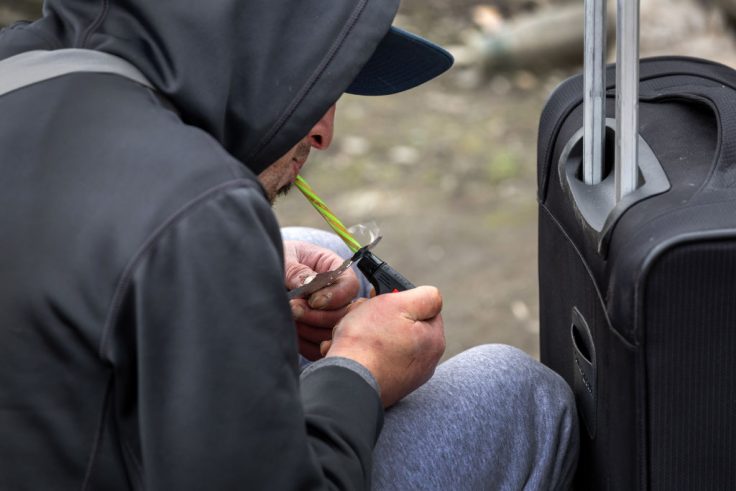A key component of President Joe Biden’s effort to combat the opioid crisis could backfire and lead to both an increase in overdoses and demand for narcotics, experts warn.
The White House is making naloxone, a drug used to reverse opioid overdoses, available over the counter. Public health experts say the policy is not only a tacit admission that deadly opioids such as fentanyl are here to stay but could end up creating more addicts or causing more overdoses.
"This move doesn’t address our addiction crisis in the slightest," said Dr. Keith Humphreys, a Stanford University professor who has helped craft drug policy in multiple White Houses and in the United Kingdom. "You would never say 'Okay, I’m rolling out a new plan for cancer for the country, we’re going to open a lot more hospice facilities.'"
The policy change was revealed on Tuesday as part of an initiative to crack down on illicit fentanyl supply chains. It comes amid bipartisan criticism that the Biden administration has largely overlooked the drug crisis that has claimed hundreds of thousands of American lives over the last decade.
The focus on easing the availability of naloxone continues the White House’s broader focus on so-called harm reduction, a public health theory that posits governments should work to minimize the potential hazards surrounding drug use, rather than work to end it. The Biden administration’s harm reduction approach, which most notably included their funding for safe smoking kits that contain crack pipes, has garnered widespread criticism.
At least 106,699 Americans died from a drug overdose in 2021, the year with the most recently available data. Most of those deaths were due to fentanyl or other synthetic opioids. The rate of overdose deaths in the United States has more than tripled since 2001.
There is no disputing the fact that naloxone saves the lives of someone suffering from an opioid-related overdose. If immediately supplied—typically in the form of a nasal spray—to someone who ingested a fatal amount of fentanyl, for example, naloxone essentially blocks the effect of that drug.
But naloxone does not treat addiction and may actually encourage more drug use. At least one study concluded in 2018 that proliferation of the drug increased opioid-related deaths by 14 percent in the midwest. The authors also found "that broadening naloxone access increased the use of fentanyl."
"Being addicted to drugs sucks," said Humphreys. "That’s not reduced by things such as naloxone."
Other research indicates that similar harm reduction initiatives do little to solve overdose problems or social pathologies associated with addiction. A 2016 study on a Danish program to expand methadone, a narcotic that is often used to treat opioid addiction, found that the decrease in heroin overdoses was equal to the rise of methadone overdoses—meaning there was no public health benefit to the new harm reduction program.
"In theory safe drug supplies should lower overdose rates, but in reality we don’t see that, it’s not delivering on the public health promise," said drug policy expert David Murray, who worked on federal drug and health policy under former presidents George W. Bush and Barack Obama. "The best predictor of dying from an overdose is having previous episodes of being revived from an overdose."
Easing the access of naloxone may save immediate lives, Murray and Humphreys say, but it could also create perverse incentives to continue using risky drugs. What the White House should be doing, they argue, is cracking down on the import of fentanyl from countries such as Mexico and China.
Biden isn’t alone in embracing harm reduction, although he is the first president to make it an explicit priority. Part of his budget request for the 2024 fiscal year includes $100 million for "harm reduction services like Naloxone" and the leader of the White House’s Office of National Drug Control Policy has called for "young people" to carry naloxone with them.
The days of the "Just Say No" anti-drug campaigns are gone as well. Biden’s 2022 National Drug Control Strategy memo mentions education initiatives based around "addressing stigma" faced by "PWUD" (people who use drugs), rather than a concerted nationwide campaign warning people not to use illicit substances.
The White House did not respond to a request for comment.
The White House's position has been embraced by cities such as New York, which last year funded a public health campaign featuring a woman saying "Don’t be ashamed you are using, be empowered that you are using safely." Meanwhile, Murray says, drug addiction and overdoses continue to climb.
"Compare this with how the Biden administration talks about gun deaths. They don’t treat them as something that’s negotiable, they’re not saying we need to give tourniquets to school children in case there’s a shooting," Murray said. "But with fentanyl they say, ‘No, this is impossible to stop and we know you’re going to use it.’"
